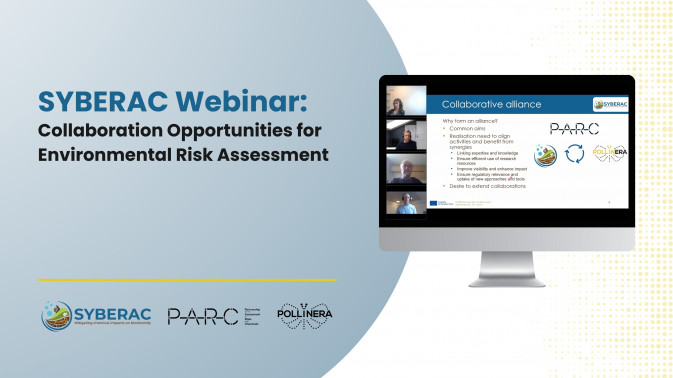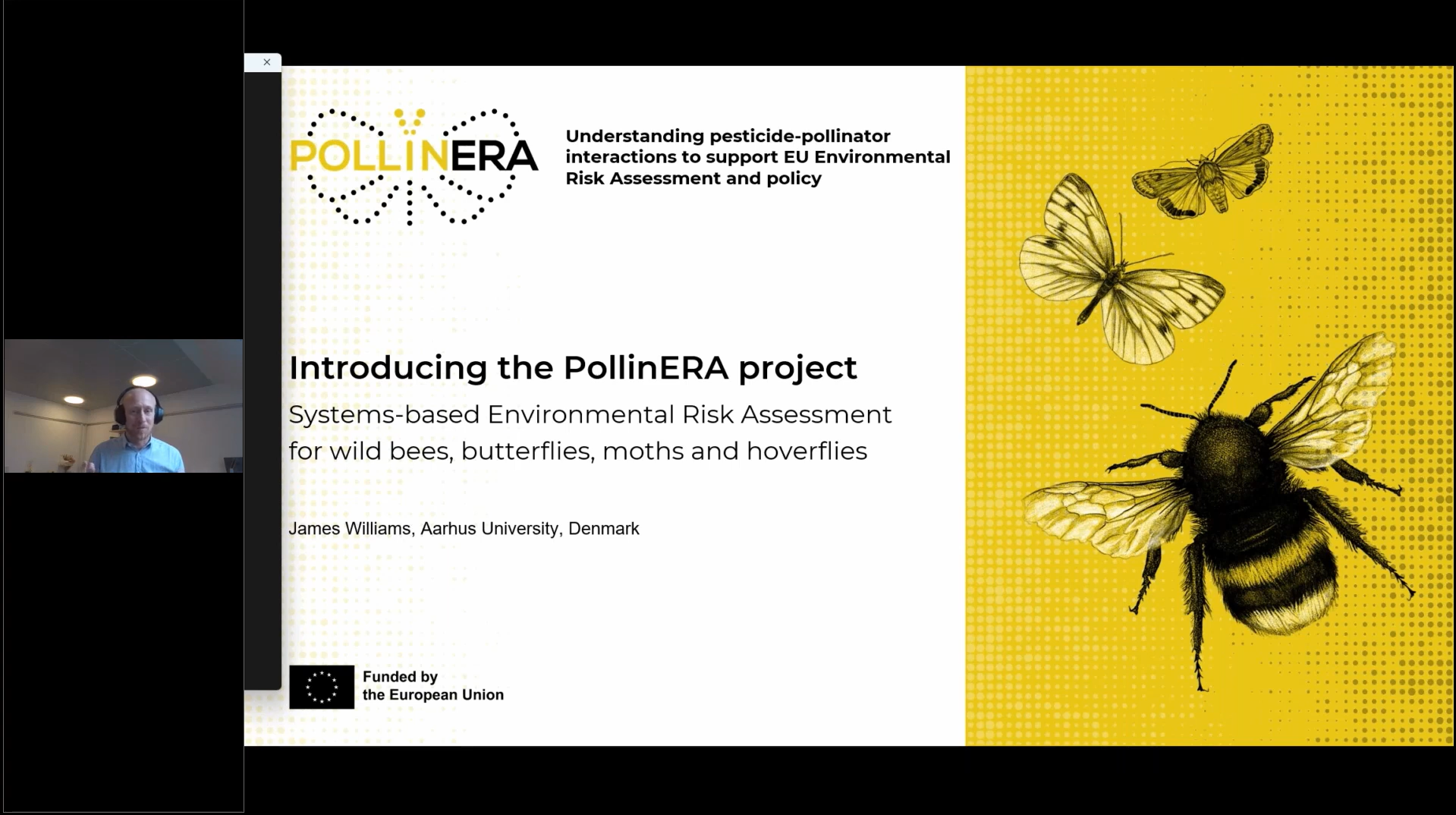Collaboration Opportunities for ERA: PollinERA and PARC took part in SYBERAC’s first webinar

Recently, PollinERA has partnered up with the EU-funded projects SYBERAC and PARC, sharing the common aim to meet the European Commission’s Green Deal policy targets by advancing the Environmental Risk Assessment (ERA) methodologies.
Committed to open exchanges of information, a joint event was held to outline collaborative activities between three EU-funded projects. This SYBERAC-organised event was the project's first webinar: ‘Collaboration Opportunities for Environmental Risk Assessment’ and was held on 11 September 2024. The online event was open to anyone interested in advancing the ERA of chemicals. You can watch the entire recording of the webinar on YouTube here.
During the webinar, PollinERA was presented by project partner James Henty Williams (Aarhus University), who outlined the project objectives, concept, approach and engagement activities, as well as the expected results and outcomes. The introductory presentation of the project is available in the media centre here.

A screenshot of James H. Williams presenting the PollinERA project during the webinar ‘Collaboration Opportunities for Environmental Risk Assessment’
James H. Williams highlighted the common aim of the three projects – sustainable food production and lessening the impacts of chemicals by advancing ERA. He also pointed out the broadly similar research areas, such as systems-based approaches, better understanding of exposure and impacts (multiple chemicals), development of new methods, tools and models, and establishment of co-monitoring and open data. One of the main aims of this collaboration alliance is to avoid any overlaps and to take advantage of opportunities to fill knowledge gaps. The collaboration between projects needs to ensure the efficient use of research resources to enhance scientific developments. Moreover, collaboration with stakeholders is needed to ensure regulatory relevance and uptake of new approaches and tools.
About SYBERAC
Towards a SYstems-Based, holistic Environmental Risk Assessment of Chemicals (SYBERAC) is a four-year EU-funded project, aiming to better understand the terrestrial routes and patterns of exposure and the associated, potential toxicological and ecological impacts of chemical pollution (excluding industrial contamination) on terrestrial biodiversity, ecosystems, and ecosystem services. The SYBERAC vision is to deliver the underpinning science, methods and tools that can support a transition of terrestrial chemical risk assessment into a systems-based ERA (sb-ERA) designed to protect genetic and functional diversity and ecosystem services. At the core of SYBERAC, there is a collaborative knowledge-building process that integrates expertise and knowledge from relevant actors to improve understanding of how chemicals impact terrestrial ecosystems.
Learn more about SYBERAC here.
About PARC 6.4.4
Partnership for the Assessment of Risk from Chemicals (PARC) is a public-public partnership working for the benefit of human health and the environment by developing better chemical risk assessment and supporting the implementation of research and innovation for societal benefit. The 7-year partnership under Horizon Europe aims to promote European cooperation, advance research, increase knowledge of chemical risk assessment and train relevant methodological skills. The results will help launch European and national strategies to reduce risks posed by hazardous chemicals to health and the environment. Further on they will help to reduce animal testing and implement strategies for next-generation risk assessment.
The PARC’s Activity 6.4.4 “Risk assessment to support and promote efficient overall protection of biodiversity” follows two main objectives:
-
Update and modernise ERA within the current regulatory framework;
-
Develop and implement a system-based approach to ERA;
-
Consider environmental context more realistically;
-
Overcome limitations caused by the current substance-by-substance ERA paradigm;
-
Simplify methods to speed up ERAs and focus evaluation efforts;
-
Better connect data resources and areas of expertise.
Learn more about PARC here.
About PollinERA
Coordinated by The Social-Ecological Systems Simulation (SESS) Centre, Aarhus University and Prof. Christopher J. Topping, PollinERA (Understanding pesticide-Pollinator interactions to support EU Environmental Risk Assessment and policy) aims to move the evaluation of the risk and impacts of pesticides and suggestions for mitigation beyond the current situation of assessing single pesticides in isolation on honey bees to an ecologically consistent assessment of effects on insect pollinators.
This will be achieved through the development of a new systems-based environmental risk assessment (ERA) scheme, tools and protocols for a broad range of toxicological testing, feeding to in silico models (QSARS, toxicokinetic/toxicodynamic, and ALMaSS agent-based population simulations). Using a strong stakeholder co-development approach, these models will be combined in a One System framework for risk assessment and policy evaluation including an international long-term monitoring scheme for pollinators and pesticides.
Learn more about PollinERA here.